13 Times It Makes Sense to Spend More
Every shopper wants a deal.
No one wants to think they overpaid for items they need and want. But sometimes you have to invoke the old “you get what you pay for” cliché. Bargains have hidden costs, either in real money to replace a cheap item that breaks and needs to be replaced, or non-monetary costs because the cheaper item can impact your experience (and, in some cases, your health).
We reached out to consumer experts and asked them to tell us which items we should consider splurging on and why.
Here’s what we learned.
Mattresses
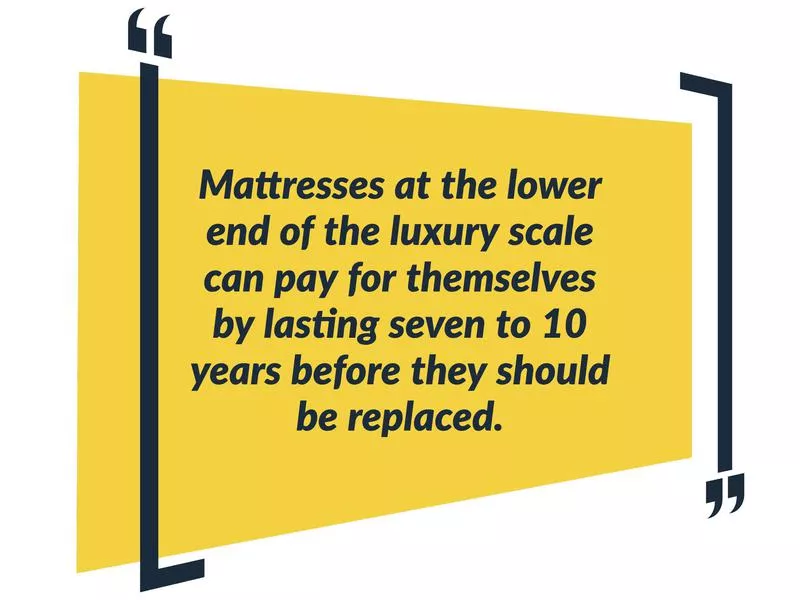
Hands down the number one response we got when we asked consumer experts where we should spend more was mattresses. The advice almost always came with this rationale: “You spend a third of your life sleeping.”
Mattresses in the $1,000 to $1,500 price range are the lower end of luxury mattresses. That’s a good place to start.
There’s an argument to be made that mattresses in this price range pay for themselves by lasting seven to 10 years before they should be replaced. Budget-priced mattresses tend to wear down and become uncomfortable – and possibly unhealthy for your body – in less than five years.
Clothes (Especially Shoes)
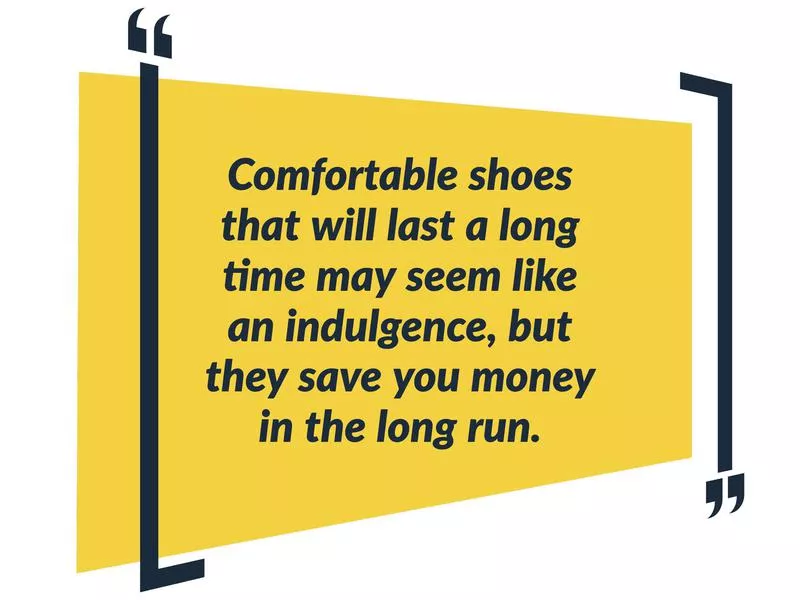
If mattresses were the number one response we got, shoes ran a close second place.
Comfortable shoes that will last a long time may seem like an indulgence, but they save you money in the long run. They won’t need to be replaced as often as cheap shoes, and they can help you avoid health problems down the road.
In general, however, our consumer experts agree that clothes are an area where we should splurge. They last longer and look better.
And along those lines, care for those clothes is worth the extra expenditure. Pick a dry cleaner on reputation and reviews, not price, and pay a tailor to make sure those clothes you spent extra money on fit comfortably and make you feel good.
Cell Phone Service
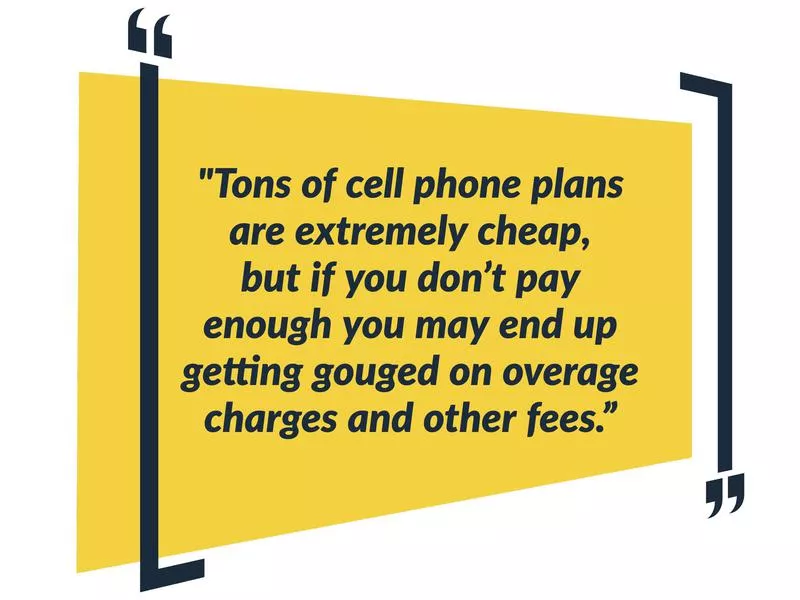
Billboards, television commercials and online advertising all promise cheaper cell phone plans with no degradation in the quality of service. But before you switch to a cheaper plan, read the fine print.
“Tons of cell phone plans out there are extremely cheap, but if you don’t pay enough for the plan, you may end up getting gouged on overage charges and other fees,” says Logan Abbott, president of Wirefly.com. “In addition to being charged overage fees for usage, you may also end up paying the price in terms of convenience and utility, if the carrier does not feature good coverage and reception in the areas you use your phone the most.”
Credit Cards
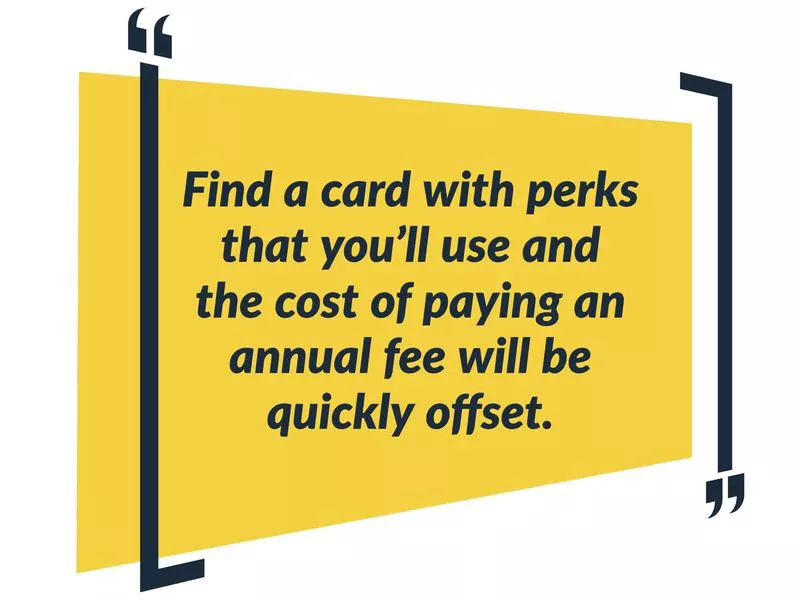
Decisions about credit cards should be made based on which company offers the best interest rate, particularly if you carry a balance from month-to-month. But don’t be too quick to succumb to that “no annual fee!” come on, advises Stacy Caprio formerly of Deals Scoop.
“Some cards with an upfront fee also offer up to $500 cash or airline value miles back for meeting their three month minimum spend threshold, plus other perks such as free airline clubs and more,” she said.
Find a card with perks that you’ll use and the cost of paying an annual fee will be quickly offset.
Food
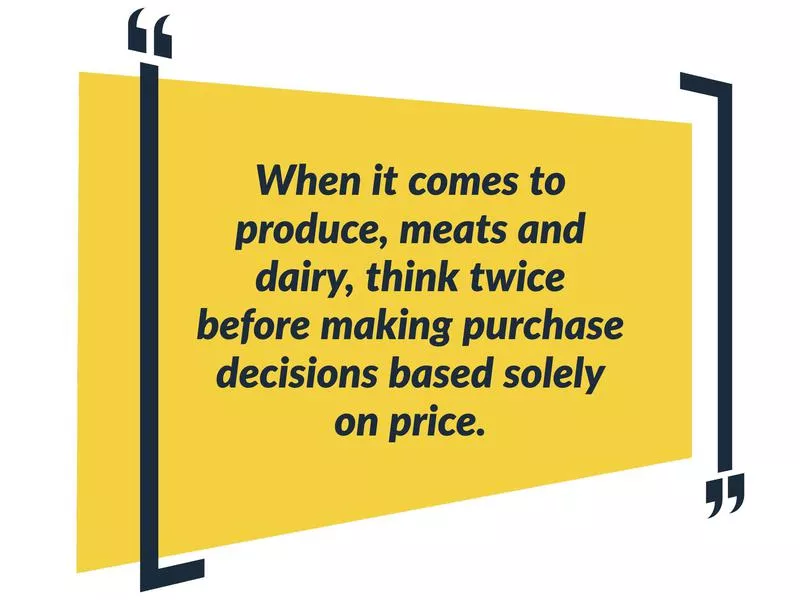
As the husband of a Whole Foods executive, I’ve heard the “Whole Paycheck Foods” joke more than once…today.
My wife is quick to point out that people who think nothing of a $5 latte at Starbucks or putting premium gas in their car tend to be the first to get outraged when asked to spend 50 cents more for a dozen eggs that are fresher and tastier than the eggs found at a discount supermarket.
The bottom line: Cheap food tends to be processed food. Some foods are going to taste the same and offer the same nutritional value whether you buy the generic version or the fancy imported version, but some foods are worth spending more money.
Those foods tend to be found on the outer perimeter of the supermarket. The grocery items in the middle aisles are where you should hunt for bargains, but when it comes to produce, meats and dairy, think twice before making purchase decisions based solely on price.
Automobile Tires
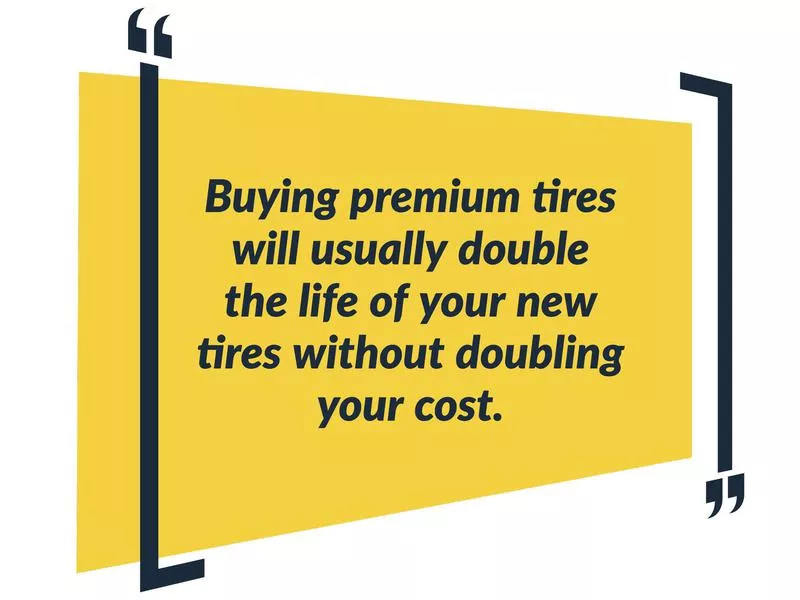
The tires that come with a new car are good for about 40,000 miles. That’s the same as the cheapest tires available when you go to the auto shop to replace them. But buying premium tires will usually double the life of your new tires without doubling your cost.
Timothy Wiedman, a retired professor at Doane University in Nebraska, lives in snow country. He’s also an avid skier, so he’s used to paying a premium for snow ties. But he’s also noticed that the extra money spent on higher quality tires saves him money in the long run, regardless of the weather conditions. When he replaced the factory-installed tires on his Chevy HHR after 40,000 miles, he opted for top-of-the-line tires from Goodyear.
“By the time I traded in that HHR, I’d put nearly 65,000 miles on those Goodyears, and the tread depth was still great,” he said. “I never had to rebalance those tires, and they wore beautifully, although I did have them rotated once a year.”
He adds: “Did those Goodyears last the full 80,000 miles? Who knows. But I felt very safe driving on that set of tires – and I never had to pay big bucks for a tow truck to pull me out of a ditch.”
Coffee and Coffeemakers

Don’t get us wrong. We’ve had plenty of good cups of coffee made using minimalist methods. Cowboy coffee made in a pan over an open fire and a pour-over using unscented toilet paper made by a college roommate after we ran out of filters both come to mind as memorable – and not half-bad – cups of joe.
But investing in a good coffee maker has an unintended effect: It makes you want to make coffee at home, which means you spend less at the fancy and expensive coffee shops. Add in impulse purchases of pastries you don’t really need, and that daily trip can cost you $50 a week.
If you’re a coffee drinker, though, you probably already know that the difference between good and great coffee is all in the bean. Splurge for the better beans that you grind at home.
You’ll still save money and you’ll still end up with a better cup than any chain-store barista can make.
Insurance
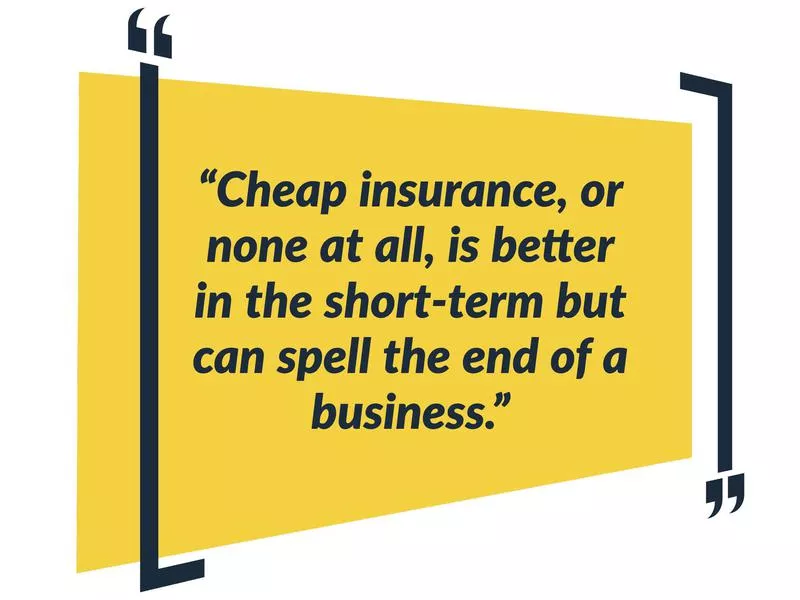
Matthew A. Struck, a former partner at Treadstone Risk Management, says people and businesses should make insurance decisions based on value, not price.
“Many times – but not always – the higher priced policy is a better fit for the risks that their business faces,” he said. “A huge percentage of businesses never reopen following a large property loss or liability claim. Cheap insurance, or none at all, is better in the short-term but can spell the end of a business.”
Tools
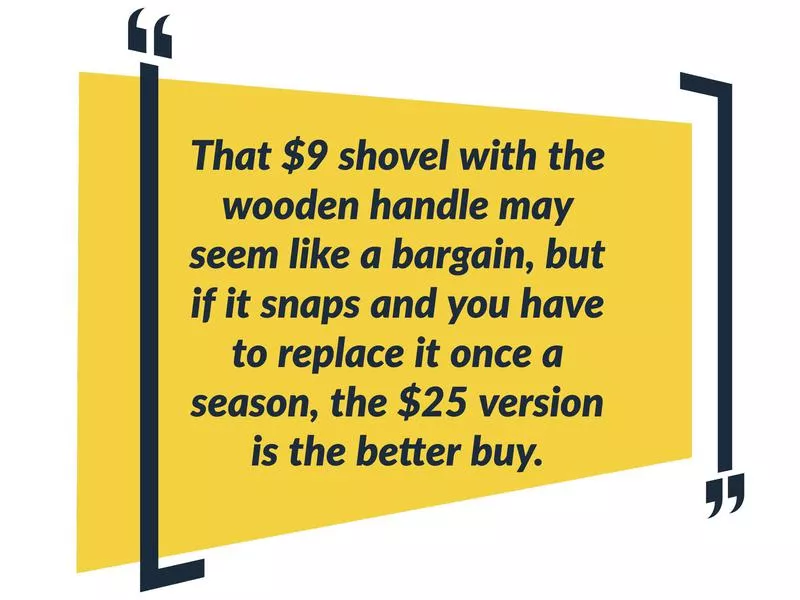
Not everyone needs to buy high-quality tools. If you’re the type of person who wants to keep a basic toolbox on hand to make basic home repairs as needed, you can stick to the bargain bin.
But if you have any designs on taking on some DIY projects or live in an older house where repairs are more frequent, investing in higher-quality tools will be worth it.
The key with purchasing tools: Determine how often you’re likely to use them and make the cost calculations from there. That $9 shovel with the wooden handle may seem like a bargain, but if it snaps and you have to replace it once a season, the $25 version is the better buy.
Paint
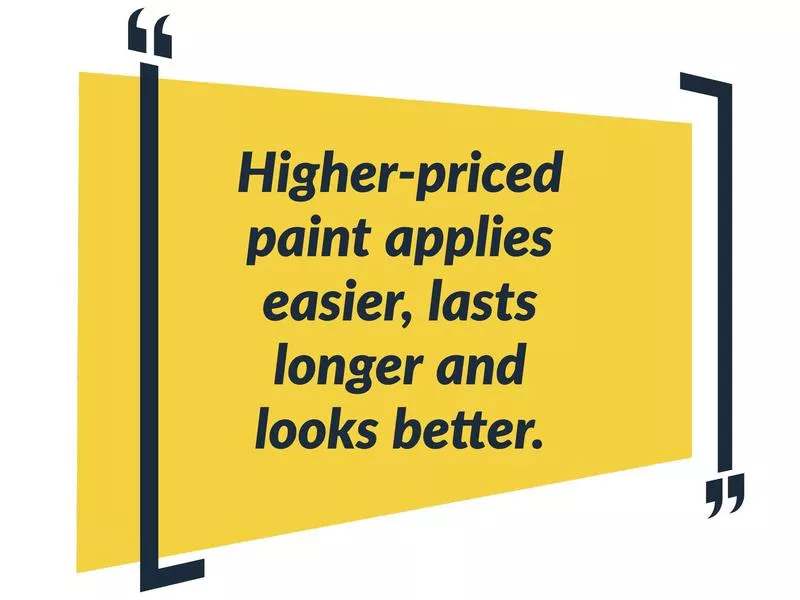
You can buy two gallons of the cheap paint to apply multiple coats – or you can buy a gallon of the good stuff and get by with one coat.
The higher-priced paint will also apply easier, last longer and look better.
Also, consider investing in higher-quality brushes and rollers if you see more than one or two paints jobs in your medium-term future. With proper cleaning and care, they can last for multiple paint jobs and work a lot better than the cheaper versions.
Cheap brushes tend to work for one job – and barely, at that – before they need to be replaced.
Extended Laptop Warranties
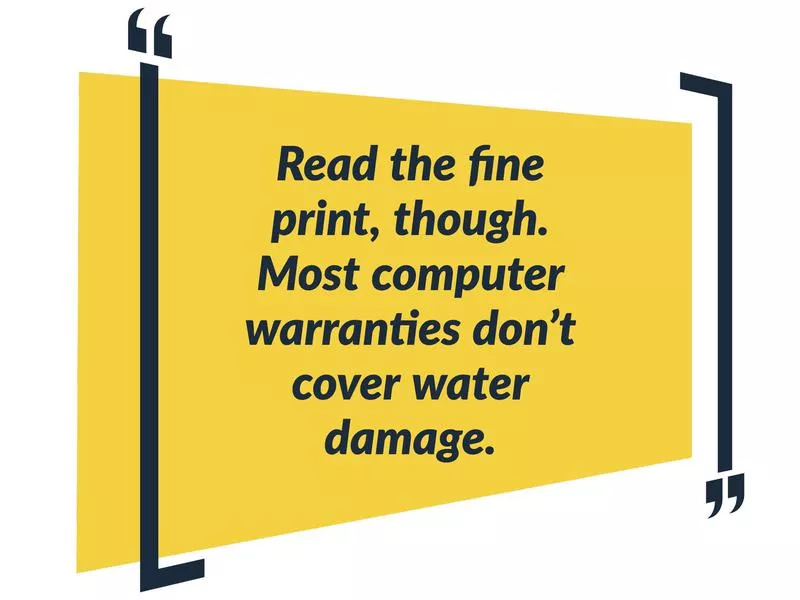
For many electronics, the extended warranty is a joke. It’s designed to wring a few extra bucks out of you.
Still, think twice before you click “no thanks” when you order a new computer. A laptop warranty is usually cheaper than the hundreds of dollars it takes to fix a broken computer, and it’s certainly cheaper than the $1,000 or more you’ll need to replace it.
Read the fine print, though. Most computer warranties don’t cover water damage. Other types of problems may not be covered, either. If you’re prone to certain kinds of accidents, keep that in mind.
Kitchen Knives
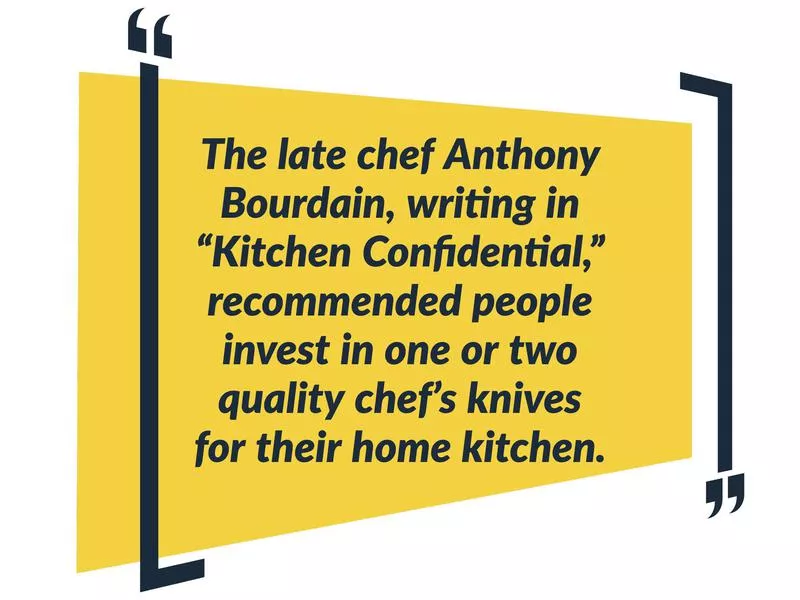
Here’s a cooking secret: Dull knives are more dangerous than sharp knives. They force you to do more work, which increases the chances of slippage when you’re slicing and dicing. And that increases the likelihood of nasty cuts.
That’s one of the reasons why the late chef Anthony Bourdain, writing in “Kitchen Confidential,” recommended that people invest in one or two quality chef’s knives for their home kitchen. One of those knives might set you back more than an entire wedding gift knife set. But a good versatile chef’s knife can last forever with minimal care.
Bourdain’s choice was the Global G-2 eight-inch knife. I bought it after reading his book and it’s still the knife I use for 95 percent of the cooking I’ve done in the eight years later.
I’ve added a few more Global knives to our collection as I’ve gotten more serious about cooking, but it’s the eight-incher I paid $100 that’s my primary culinary tool.
Spending on Other People
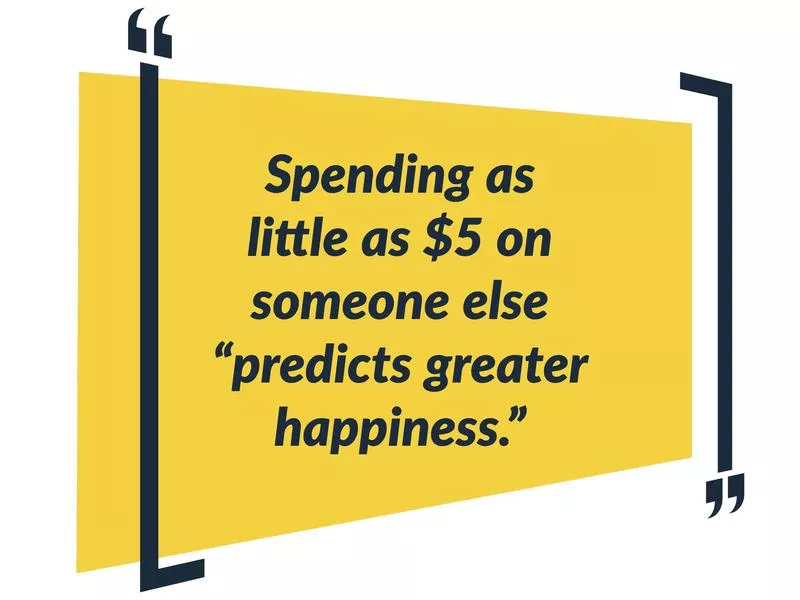
This one isn’t quite a money saver. It’s more of a life enhancer, and you don’t even need to spend too much. Spending as little as $5 on someone else “predicts greater happiness,” according to an often-cited study by researchers at University of British Columbia and Harvard Business School.
There are plenty of ways to do this, including donating to charity. Spend money on the people you care about, or spend money on strangers.
One of my favorite tricks: When we’re grabbing coffee at the drive through, we offer to pay for the car behind us as well.